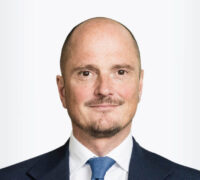Preparing to transform and thrive
These strategic goals are underpinned by significant investment in a business transformation program known as Fit for Growth. De Giorgi is one of four executive sponsors of the initiative, alongside leaders in strategy, risk, and technology. What sets the program apart, he says, is its holistic approach. “We’re trying to reform processes that cut across the organization. It’s a program that aims to make the bank an easier place in which to do business, for clients and colleagues alike.”
Much of this hinges on technology that is impactful, but not necessarily the most eye-catching. “It’s not just deploying AI at what I call the sexy end. Very often, it deploys AI in its most fundamental and hard-grafting manifestations,” says De Giorgi.
One example is the rollout of a new platform called ‘Service Bench,’ which standardizes internal tools and streamlines tech architecture across the bank. De Giorgi likens the bank’s global operations to a tree that, over the years, has developed numerous offshoots and “bumps.” The service bench platform, he says, helps “prune” the tree, bringing order, consistency, and scalability.
“It’s fundamentally a solution where you input what you are trying to do and the system will give you standardized tools based on what you are trying to execute,” he explains. For a bank such as Standard Chartered, operating across more than 50 markets, this consistency is critical. Instead of building one-off, country-specific solutions, teams use shared platforms to develop and deploy applications faster and more efficiently – that in turn are enhanced iteratively.
Even for customer-facing tools, much of the value lies in process improvements that the customer doesn’t see, such as automating compliance workflows. “Know your customer and customer due diligence are two of the areas where we are deploying Service Bench and AI very heavily,” De Giorgi says. “These are areas where automation and big data help a lot.”
By implementing such cross-sectional platforms, Fit for Growth aims to create a bank that is more standardized, simplified, and digitized.






